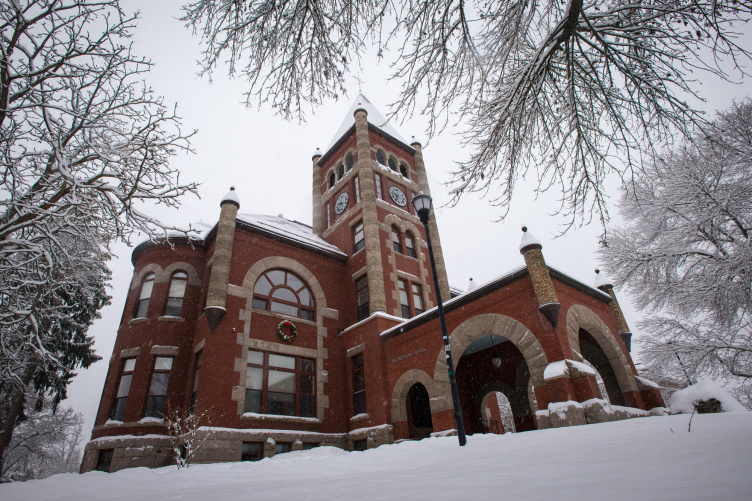

CONCORD, NH — With little fanfare, budget writers decided to alter Gov. Chris Sununu’s plans for merging the state’s two higher education systems.
Division II of the House Finance Committee Wednesday approved a plan to appoint a commission to investigate and potentially propose legislation next year that would begin merging the University System of New Hampshire with the Community College System of New Hampshire.
The amendment also appropriates $1.5 million for the commission and would leave the two systems intact through the upcoming biennium with separate budgets.
The committee also approved increasing state funding for the two systems to equal what they received for this biennium, an increase of $11 million over what the governor proposed in his budget, $278 million.
On Tuesday, the division members discussed two amendments that both would create commissions, one a study commission to determine if a merger should go forward proposed by Rep. Mary Heath, D-Manchester, and the other creating an 11-member commission to investigate the merger and potentially propose legislation by Jan. 1, 2023, proposed by Rep. Leonard Turcotte, R-Barrington.
At Wednesday’s meeting, the only amendment offered was Turcotte’s with a couple of changes from the day before.
Heath said in withdrawing her amendment and supporting Turcotte’s “the purpose was to try and slow this process down a bit, and this accomplishes what we wanted to do.”
Sununu proposed the merger during his budget address and sought to establish a single board of trustees for a merged system by July 1.
But that plan was criticized as being unrealistic with the mammoth amount of issues needed to be resolved before the two systems could merge.
Under Turcotte’s plan, a commission would be created that includes four members from the University System of New Hampshire including the chair of the Board of Trustees and the chief executive or administrator, four members from the Community College System of New Hampshire including the chair of the Board of Trustees and the chief executive or administrator, and three members appointed by the governor.
Under his proposal, the commission would also serve as a search committee for a new chancellor for a unified system if that is the recommendation the members adopt.
The commission would focus on a report done by a subcommittee of House Education outlining the concerns and questions the members believe need to be explored and answered as the state moves to address the problems facing the two higher education systems.
Both the university and community college systems have seen declining enrollment as the number of high school graduates have been trending down in recent years and that is expected to continue for a generation.
The coronavirus pandemic accelerated the need for the two systems to change as declining revenue from tuition and room and board have impacted the systems’ future sustainability.
The merger discussion has been ongoing since last year, but received greater attention after Sununu made his proposal in his budget address last month.
Since that time, opposition has come from many fronts including former trustees who said it needs careful examination before moving forward.
Others are concerned the community college system would lose its voice, affordability, mission, and flexibility in a merged system which they believe would be dominated by the University of New Hampshire.
The division approved the amendment on a 7-0 vote, and increased funding for the two systems above what the governor proposed on a 6-1 vote.
The committee also decided to remove most of the money from the Public School Infrastructure Fund in the governor’s proposed budget.
The governor included $15 million in each year of the biennium, and the division decided to fund the program at $1 million a year, and use the remaining $28 million for other programs.
The money was instead used for additional catastrophic special education aid for school districts ($5.67 million), to level fund the university and community college systems ($11 million), dual enrollment program ($3 million), robotics education ($1.5 million) and three lab positions in the Department of Safety ($507,000).
In the governor’s recommended budget, there was no money for the dual enrollment program for high school students to attend community college courses for credit, or in the robotics education program.
The committee considered adding $3 million to the Department of Education for operating costs for a new student information system, but no one moved to put the money in the budget.
The governor’s budget did not include operational funding for the new system, but the department asked for the money at a committee meeting Monday.
The committee also agreed to add about $2 million in funding to the kindergarten start up program to help fund the first year for programs that began operating full-time during this biennium.
While most of the changes were unanimously approved, a plan to increase the cap on charter school leases from $30,000 to $50,000 a year was down party lines, 4-3 in favor with Democrats voting against.
The money does not increase the total amount of money the state allocates for lease reimbursement but does increase the cap.
The committee will meet Thursday morning to finalize its work on its sections of the budget.
The House Finance Committee will make its final budget decisions Tuesday and present its plan to House members on April 5. A final House vote on the budget is expected early on April 7.
Then the Senate will do its work on its budget proposal with a final budget in place by July 1 for the beginning of the 2022 fiscal year.
Garry Rayno may be reached at garry.rayno@yahoo.com.







